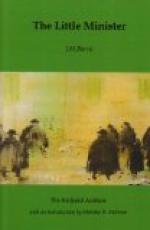When the little minister looked out at the carriage window, many of the people drew back humbly, but a little boy in a red frock with black spots pressed forward and offered him a sticky parly, which Gavin accepted, though not without a tremor, for children were more terrible to him then than bearded men. The boy’s mother, trying not to look elated, bore him away, but her face said that he was made for life. With this little incident Gavin’s career in Thrums began. I remembered it suddenly the other day when wading across the wynd where it took place. Many scenes in the little minister’s life come back to me in this way. The first time I ever thought of writing his love story as an old man’s gift to a little maid since grown tall, was one night while I sat alone in the school-house; on my knees a fiddle that has been my only living companion since I sold my hens. My mind had drifted back to the first time I saw Gavin and the Egyptian together, and what set it wandering to that midnight meeting was my garden gate shaking in the wind. At a gate on the hill I had first encountered these two. It rattled in his hand, and I looked up and saw them, and neither knew why I had such cause to start at the sight. Then the gate swung to. It had just such a click as mine.
These two figures on the hill are more real to me than things that happened yesterday, but I do not know that I can make them live to others. A ghost-show used to come yearly to Thrums on the merry Muckle Friday, in which the illusion was contrived by hanging a glass between the onlookers and the stage. I cannot deny that the comings and goings of the ghost were highly diverting, yet the farmer of T’nowhead only laughed because he had paid his money at the hole in the door like the rest of us. T’nowhead sat at the end of a form where he saw round the glass and so saw no ghost. I fear my public may be in the same predicament. I see the little minister as he was at one-and-twenty, and the little girl to whom this story is to belong sees him, though the things I have to tell happened before she came into the world. But there are reasons why she should see; and I do not know that I can provide the glass for others. If they see round it, they will neither laugh nor cry with Gavin and Babbie.
When Gavin came to Thrums he was as I am now, for the pages lay before him on which he was to write his life. Yet he was not quite as I am. The life of every man is a diary in which he means to write one story, and writes another; and his humblest hour is when he compares the volume as it is with what he vowed to make it. But the biographer sees the last chapter while he is still at the first, and I have only to write over with ink what Gavin has written in pencil.




